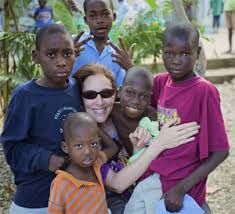Child Development
Will You Be My Mother?
A nameless girl's question helped me to let go of my own childhood wounds.
Posted October 1, 2014
I had been in Rwanda for a month, tracing the footsteps of the genocide in the ten thousand hills. This was my last morning, alone in the genocide museum near Kigali. The perfect place to reflect on all I had seen. At the end of the hall there was an alcove room lit only by a smattering of sunlight. I stopped short, met by the smack of larger than life, black-and-white photos on the walls.
A boy with wild curls sat in front of a sandbox, waving a red shovel. “Look at me!” he demands. I imagined his father standing on the other side of the lens, laughing and encouraging his precocious son. My chest ached with a sick knowing, even before my gaze dropped to the epitaph:
Patrick, age 5
Best friend: Alaine, his sister
Favorite food: chips
Favorite thing to do: Make people laugh
Cause of death: Whacked by a machete
I was alone, or so I thought. The low hum of conversation in the garden outside floated through the window, like a chant. A hymn that held the whisper of a question. A question that had been haunting me for forty-three years, since before I had the words to speak it.
Tears slid down my cheeks, images of the past month clicking through my mind. The church with bullet holes in the ceiling, a blood-stained Mother Mary on the wall. The pristine Virunga Mountains where I had played with young gorillas who were likely to be shot by poachers before reaching adulthood. A shantytown where a young mother with blank eyes told me that she still believed in God but not justice. She wanted to forgive, but could never forget.
A young woman who I will always think of as a girl stepped out of the shadows; or perhaps she had been standing behind me, following me, for a long time. I recognized her from earlier: jeans and a striped t-shirt, she could have been any African teenager. She had smiled shyly at me in the garden, and I took note of her old-soul brown eyes. She was, in a way, ageless.
Now, she was looking at me, waiting, as if she had already asked a question. “Madame,” the girl said, her voice high but strong, “will you be my mother?”
My lips parted, but no words came to me. Surely, she must be asking something else, asking for something else. I fumbled in my purse, my hand grazing foil gum wrappers, lipstick tubes, scraps of Kleenex, loose change that felt dirty on my skin. I couldn’t look at the girl or the photos on the wall.
Yes, of course. This is what I wanted to answer. But there was too much in the way. My mom’s shaky voice admitting that after my older sister Susie died, when I was too young to remember, she couldn’t love her remaining three children for a long time. And then the shouts of a therapist who had held me an emotional hostage for two years, bullying me into thinking of her as my surrogate mother. Tough love, that’s what she had called it. At the time, I had been a young mom myself, afraid that I didn't know how to love my sons well enough.

Me in Haiti after 2010 earthquake
Eight years later, that moment when I turned away a girl who was, most likely, simply looking for some comfort not adoption, still haunts me. In my mind, I smile and answer yes. I imagine how that small breath of compassion might have connected me with a stranger; changed me. Changed her. Eight years later, I’m still trying, not always successfully, to answer, yes.
Jennifer Haupt contributes stories and book reviews to a wide variety of magazines. Her e-book “Will you be my Mother? The quest to answer yes,” includes three stories from her journey to love better and connect more deeply with her children, her mother, and the world. For more information about Jennifer, visit her website or Facebook page.
This essay originally appeared in Mamalode in a slightly altered form.




